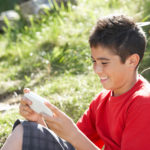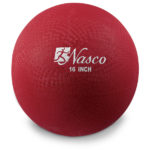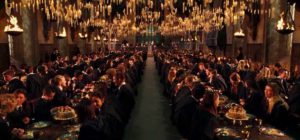You’ve probably heard this advice before. But do you understand it? As a teacher of literature, I find this a very important subject!
What happens when you read

When you read text on a page or on a screen, your brain translates the marks into words. If you’re reading English, your brain translates familiar words directly into their meaning in your head. If it’s an unfamiliar word, or if you’re a slower reader, you might need to sound it out first, then find the meaning in your head.
So when you read this phrase, this thing appears in your mind:
a red ball
But which red ball appears in your mind? Given that my words are vague, it’s probably a red ball you have seen recently, or a red ball you’re particularly fond of.

But when you read this phrase, something different happens:
the red ball I held was the color of dried blood, textured and rubbery, and a faint smell rose from it that reminded me of the day I skinned my knees
That’s my red ball, not yours. And now I’ve put my red ball into your head. And your head had to create the sensation of holding it, had to remember what color dried blood is, had to imagine a smell, and had to picture someone else falling and skinning her knees.
What happens when you watch a movie
Even though movies are often based on books, watching a movie is a completely different experience. People who make movies are also trying engage your senses, but they are doing it through images and sound. When you see a red ball in a movie, your brain might think about red balls you have known, but it doesn’t have to.
Watching movies is a more passive activity. The filmmaker gives you an image, and from then on, that image might even replace other images in your brain.
Think about Harry Potter
Most of my students have read Harry Potter and seen the movies, so it’s a good example. Here’s a quote from when Harry first sees the Great Hall at Hogwart’s:
Harry had never even imagined such a strange and splendid place. It was lit by thousands and thousands of candles which were floating in mid-air over four long tables, where the rest of the students were sitting. These tables were laid with glittering golden plates and goblets. At the top of the hall was another long table where the teachers were sitting. Professor McGonagall led the first-years up here so that they came to a halt in a line facing the other students, with the teachers behind them. The hundreds of faces staring at them looked like pale lanterns in the flickering candlelight. Dotted here and there around the students, the ghosts shone misty silver.

What did you think of when you read it? If you read the book first, you might still have the image that your brain conjured up. But if you’ve seen the movie, I would bet that you see what we all saw in the movie.
It was lovely, it was splendid, and it was a good representation of what J.K.Rowling described in her novel (though personally I thought the ghosts were all wrong!).
But here’s the description of Harry:
Harry had a thin face, knobbly knees, black hair, and bright green eyes. He wore round glasses held together with a lot of Scotch tape because of all the times Dudley had punched him on the nose. The only thing Harry liked about his own appearance was a very thin scar on his forehead that was shaped like a bolt of lightning.
If you’ve seen the movies, you probably pictured the actor Daniel Radcliffe. I didn’t! I still picture the Harry of my imagination. As much as I thought Radcliffe did a fine job, I had such a firm vision of Harry that he couldn’t displace it.
I was glad I’d read the book first.
What’s the problem with having the filmmaker’s images in your head?
Well, first of all, it’s good for your brain to think. Just like your muscles, your brain needs exercise.
But the really important thing is to know that sometimes the movie’s images can actually distort and change what you see when you read. They prepare your brain to see one thing and one thing only when it translates the author’s words into pictures, sounds, and smells.
There is a special thing that we get from reading that we can’t get from movie-watching. If we approach each book as a world unto its own, we can have our unique experience reading it. But if we prep our brains with one filmmaker’s visual choices, editing choices, and casting choices, we take away our ability to read the book with a fresh, welcoming space in our brains.
Go ahead and enjoy movies, but read the books first!

I agree with this! I always read the book first, (when I have enough warning to do so before watching the movie) and although it usually lowers my perception of how good the movie is, I still read the book first.
Thanks for your comment! Interesting that you always find it lowers your opinion of the movie. Although I’d agree that it’s hard to make a movie that does exactly what a book does, sometimes movie makers can find a way to make a great movie that is its “own thing.” I enjoy watching movies to see how directors make these choices.
good info
I agree with this totally! I also usually read the book before the movie 🙂
I agree with this totally! 🙂